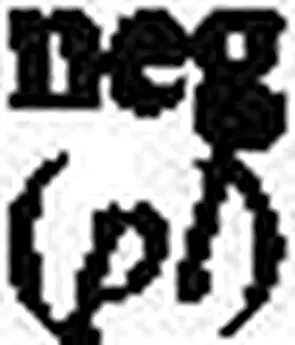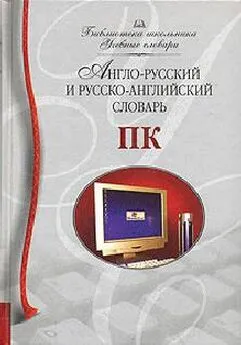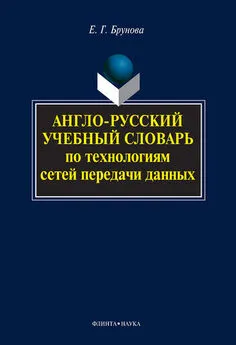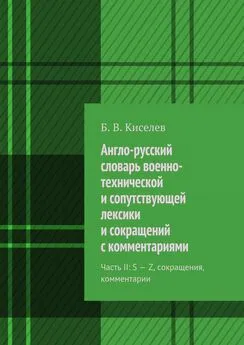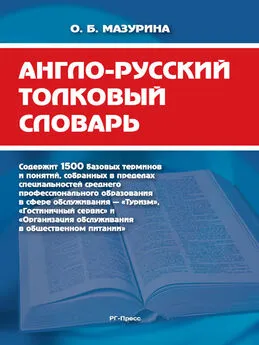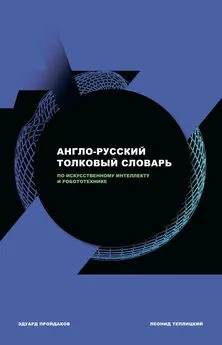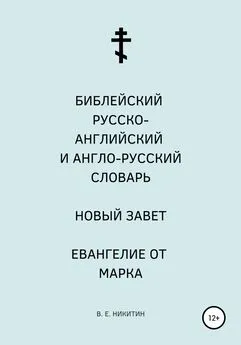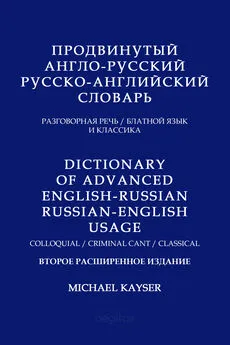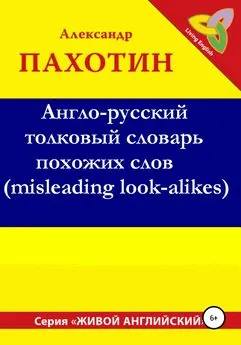Е.А.М.Уилсон - Англо-русский учебный словарь 1984
- Название:Англо-русский учебный словарь 1984
- Автор:
- Жанр:
- Издательство:неизвестно
- Год:0101
- ISBN:нет данных
- Рейтинг:
- Избранное:Добавить в избранное
-
Отзывы:
-
Ваша оценка:
Е.А.М.Уилсон - Англо-русский учебный словарь 1984 краткое содержание
Англо-русский учебный словарь 1984 - читать онлайн бесплатно полную версию (весь текст целиком)
Интервал:
Закладка:
A comma is used:
when two separate translations are offered for one English phrase, thus: in a manner of speaking в какой-то степени, можно сказать;
when English combinations separated by a diagonal stroke require two different Russian translations, thus: vegetable soup/salad овощной суп, салат из овощей.
Both the diagonal stroke and the comma may be needed when translating more than two English combinations, thus: a violent blow/attack of fever/explosion сильный удар/ приступ лихорадки, мощный взрыв.
"Or": when an alternative translation is shown within an alternative, the "sub-alternative" is indicated by the English word "or" written in italics, thus: I'm going to visit my sister я собираюсь ( to drop in) зайти к сестре /(to stay) навестить сестру or погостить у сестры; bad manners/news плохие or дурные манеры/вести.
GRAMMAR: TREATMENT OF NOUNS
A knowledge of basic grammar and permutations of vowels is assumed. Gender is shown only for common nouns, and for masculine nouns ending in the soft sign, or in a non-mascu- line termination, thus:
левша ( m and f) дождь (m) слуга (m) домишко (m).
Indeclinable nouns are noted and can be assumed to be neuter, unless a gender is given. Collective nouns are noted, as also are nouns which have no singular or no plural, thus: кофе (m, indect) кино ( indect) картофель (m, collect) щипцы (no sing) обувь (no pi).
These indications are given every time а поиц appears as a general translation of the headword, but not always otherwise, except for (collect).
GRAMMAR: TREATMENT OF VERBS
The imperfective aspect is treated as the basic form of all verbs with its perfective form shown in round brackets. The following are the abbreviations used to give aspectival information:
писать (на-) (= pf написать); сверкать (semel -нуть) (= semelfactive pf сверкнуть);
when the verb is for any reason first quoted in its perfective form, the entry runs: получ|йть (impf -ать);
where there is no established corresponding aspect, the verbs are shown thus: рыдать (impf); стерпеть (pf);
a verb which is used for both aspects is shown thus: эвакуировать (impf and pf);
when a Russian verb exists in both aspects, but translates an English usage in only one of its aspects, it is shown thus: believe vi верить (only in impf), to talk somebody out of doing something отговорить кого-л от чего-л (only in pf) or thus: to canvass for votes вести предвыборную кампанию (usu impf), to bid somebody good morning пожелать кому-л доброго утра (usu pf) (= usually (im)perfective in this usage).
Aspectival information is given only in verb entries and only when the verb is offered as a general translation of the headword, or as a translation of an English example given in the infinitive form. It is usually given only once in an entry and is not repeated for the reflexive form of the verb.
In a long entry, where several compounds of a verb may appear, aspectival information is normally shown only for the first appearance of the compound. The student can then deduce the aspectival forms of any further of these particular compounds which may appear in that entry.
VERBS OF MOTION WITH TWO IMPERFECT!VES
The terms "indeterminate" and "determinate" are used to distinguish the two imperfectives, thus: ходить ( indet impf of идти; по-), ёхать (det impf of ездить; no-) (= pfs походить and поехать).
Such verbs are fully illustrated to bring out their special meanings, especially the force of the prefix no- in the perfective forms.
The inchoative sense of the perfective of the determinate form is shown in examples, e.g. it began to rain пошёл дождь. It is shown how, in order to translate the determinate verb in a true perfective sense, the perfective of one of its compounds must be used, e.g. he's gone off to bathe/to the theatre он пошёл купаться, он ушёл в театр (= "he set off to bathe", but "he has gone to the theatre").
The perfective of the indeterminate form is illustrated as meaning to do something for a while, without particular purpose or direction. The student will find throughout the dictionary examples showing how perfective verbs, with the prefix no- used in this same sense, can be formed from many imperfective verbs (though they are not held to be aspectivally related), e.g. to flirt a little пофлиртовать (pf).
THE TRANSLATION OF "IT"
The entry for "it" shows how the correct translation depends on the gender of the antecedent word. By convention, in brief examples where the antecedent is not shown, "it" is translated by это.
А
А п (letter) буква «а»; Mus ля; (in school) «отлично» (as indecl л), пятёрка [5 = highest school mark in SU\ ; to get an A for/in geography получить пятёрку по географии; to get "A"s all the time учиться на отлично, быть отличником; to know smth from A to Z знать что-л от «а» до «я».
a (an) 1 indefinite article , not translated: without a doubt без сомнения; a lot of money много денег; a little more чуть/ немного больше; they answered "yes" to a man все до единого ответила «да»; he's a friend of mine он мой друг; a friend of mine told me один мой приятель сказал мне
(a certain) некий, какой-то; a Mr Smith has called приходил некий мистер Смит
after "many", " such", "what" with nouns and adjs : what a day! что за день!, какой день!; many a man многие (люди); what a girl! какя девушка!; such a marvellous painting такая удивительная картина
(—one): а £1 один фунт; a dozen eggs дюжина яиц; wait a minute! одну минутку!; he didn't say a word он не сказл ни слова; they're all of a size они все одного (и того же) размера
(distributive) i) в + А ; 40 miles an hour сорок миль в час; twice a day/а year дважды в день /в год; £40 a week сорок фунтов в неделю; и) по4- Л or D (see also under apiece and each); he gave them an apple each он дал им по яблоку; peaches cost a rouble/ 2 roubles a kilo персики стоят рубль/ два рубля килограмм; the students went in two at a time студенты входили по два человека/ по двое; he comes on a Tuesday он приходит по вторникам.
aback adv. he was taken ~ он был поражён, он опешил.
abacus п счёты (pi).
abandon vt I (leave) поки|дать ( :нуть); оставлять ( :ить); CQ брос|ать ( :ить); to ~ ship/a town покинуть корабль /город; to ~ one's family оставить/брбсить семью; to ~ smb to his fate бросить кого-л на произвол судьбы
2 (give up) : we ~ed all hope мы уже ни на что не надеялись; they ~ed the project/ the attempt to see him они отказались от проекта/от попытки увидеться с ним; the game was ~ ed after 20 minutes' play
через двадцать минут игру пришлось остановить.
abandoned adj: an ~ child/house покинутый ребёнок/дом.
abashed predic adj: she was not a bit ~ at/by this её это нисколько не смутило.
abate vi утих|ать, стих|ать (pfs -нуть); успокаиваться (-биться); ослабевать (-ёть and -нуть); the pain /the wind has ~d боль утихла, ветер утих / стих / ослабёл / успокоился; the floods are abating наводнение (sing) пошло на убыль [NB пошло = started to abate],
abbreviate vt сокра|щать (-тйть); an ~d text сокращённый текст, abbreviation n сокращение. ABC n азбука, алфавит, abdication n отречение, abdomen n брюшная полость, CQ живот; (of insects , etc) брюшко.
abdominal adj брюшной; — pains боль в брюшной полости/в животе; an ~ operation полостная операция.
aberration п (mental) рассеянность; Opt аберрация; Tech отклонение; in a moment of ~ по рассеянности.
abeyance п: the question is in ~ рассмотрение этого вопроса приостановлено; this rule has fallen into ~ это правило устарёло/ больше не соблюдается.
abhor vt ненавидеть (impf); (feel revulsion) питать отвращение к + D (only in impf) ; I ~ flattery/violence я ненавижу лесть, я питаю отвращение к насилию, abhorrent adj ненавистный, отвратительный, abide vti vt ( tolerate , only used negatively) терпеть, выносить (only in impfs ); I can't ~ dogs я не выношу/я терпеть не могу собак vi: to ~ by the rules/a decision придерживаться правил/решения (impf); I ~ by what I said я остаюсь верным тому, что сказал.
ability п способность (often pi) ; he has great ~ in mathematics у него большие способности к математике (sing) ; to the best of my ~ по мере своих сил и возможностей; Сотт ~ to pay платёжеспособность.
abject adj жалкий; an ~ apojogy жалкие извинения (pi) ; ~ poverty нищета, ablative п Gram творительный падёж, ablaze predic adj and adv: the house was ~ in five minutes чёрез пять минут дом ужё пылал; they set the barn ~ они подпалили
Читать дальшеИнтервал:
Закладка:
